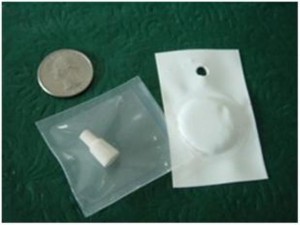In most areas of NJ, the application timing of imidacloprid to nursery containers to achieve best efficacy against Oriental beetle grubs (Anomala orientalis) has now expired. The majority of eggs are laid during late June through early July and by the time August arrives, many of the grubs will have begun to molt into the 2nd instar stage. If imidacloprid is not applied until August, then some root feeding damage may have already occurred & furthermore, the larger instars will be more difficult to control. Generally, the preventative applications should be applied from early June to mid-July to achieve best results.
Next year, some nurseries may want to attempt the new Oriental beetle mating disruption pheromone that is discussed in the second half of this article.
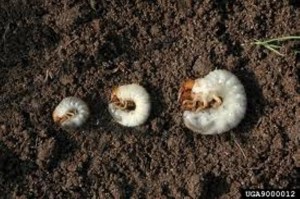
Imidacloprid has good efficacy against Oriental beetle 1st instar grubs, but is significantly less effective against the 2nd & especially 3rd instar grubs
For more than a dozen years most nursery growers in NJ have been aware of the potential damage that Oriental beetle grubs can cause to woody ornamentals being grown in containers. Although the grubs have been known to feed on a wide selection of container plant species, many nurseries over the years have reported finding them feeding on the fine-fibrous roots of ericaceous plants (e.g., Rhododendron) & plants within the genus Ilex.
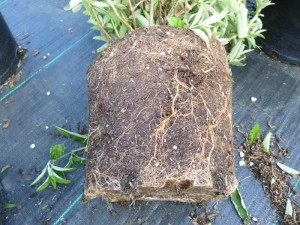
Oriental beetle grubs can potentially cause extensive root feeding damage in nursery containers Photo Credit: Steven K. Rettke of RCE
Unlike the adult Japanese beetle, the adult of the Oriental beetle (OB) is relatively inconspicuous & mysterious. It is difficult to routinely inspect for the presence of OB grubs since it requires the labor intensive searching of the media within containers. The use of traps releasing a synthetic pheromone of the female OB will attract & capture adult males. Routine monitoring of the traps in June & July will provide relative population levels & how they increase & then decrease over time. If OB captures are high, or if damage in previous seasons has been observed, then it is reasonable for nursery operations to routinely apply imidacloprid within containers every year to prevent potential damage.
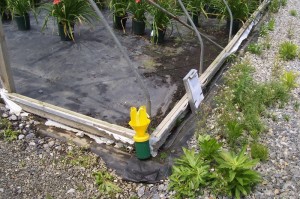
Oriental beetle pheromone trap being used in nursery to monitor adult male densities & fluctuations Photo Credit: Steven K. Rettke of RCE
Oriental Beetle Mating Disruption Pheromone:
A new IPM strategy to prevent damage by the Oriental beetle now exists for nursery growers. The use of the Oriental beetle (OB) mating disruption pheromone became commercially available in May of 2012. Insect sex mating disruption requires the target area to be saturated sufficiently with a synthetic female pheromone. This results in the inability of the males to effectively locate & mate with calling females. Consequentially, with our pest in question, the number of OB eggs laid is reduced & damage is minimized.
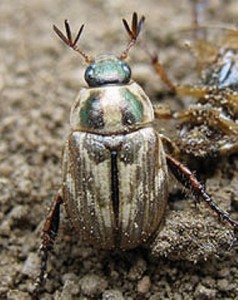
Oriental beetle adult male screening the air for sex pheromone Photo Credit: Rutgers University Research
The research indicates that field-wide Oriental beetle mating disruption in blueberries, cranberries, & ornamental nurseries is practicable. In 2005-2008, research led by Dr. Sridhar Polavarapu from Rutgers University (funding by The IR-4 Project) determined that the efficacy of the OB pheromone was still maintained when the active ingredient per acre was reduced to only 1.0-2.0 grams. These findings make this alternative control strategy economically competitive with chemical treatments. This alternative control will also reduce potential insect resistance & environmental contamination concerns by eliminating the use of pesticides.
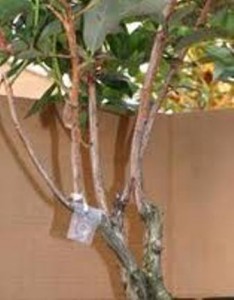
Oriental beetle retrievable MD dispenser attached to plant Photo Credit: Rutgers Blueberry & Cranberry Research
AgBio Inc. is the distributor of the “Oriental Beetle MD” (mating disruption) pheromone. It is sold in retrievable bubble dispensers (50mg/dispenser) & has an effective residual of 60 days. It can be purchased in packs of 25 ($61.25) or can be purchased individually ($2.45). The label indicates between 20-40 dispersers per acre are required to achieve sufficient concentrations. As an example, if a pack of 25 bubble dispensers are used to cover 1 acre, then the concentration of pheromone active ingredient will be about 1.25 g/acre. If the price is $61.25 per pack, then the cost to cover 10 acres equals $612. The dispensers should be positioned in a grid pattern & placed 1-2 feet above the bottom of containers. With this example, the dispensers will be placed at intervals of approximately 40 feet. It should be noted that 25 dispensers per acre is at the lower end of the 20-40 range of dispensers per acre stated on the label. The OB adult population levels within the targeted area will determine the number of dispensers required for satisfactory controls.
AgBio Inc. 9915 Raleigh St. Westminster, CO 80031 / Phone: 303-469-9221 / www.agbio-inc.com
(Reference: The IR-4 Project Newsletter, Spring 2013; “Oriental Beetle Mating Disruption: A Successful Collaboration Among IR-4, University, & Industry”; by Cesar Rodriquez-Saona & Dean Polk, Rutgers University & Erik Wenninger, University of Idaho) and (Reference: AgBio Oriental Beetle MD Label)
